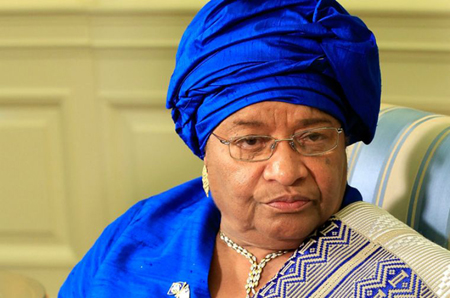
Distinguished Participants,
Since the cessation of conflict in 2003, Liberia has sought to reactivate the productive sectors, repair destroyed infrastructure, rebuild dormant institutions, develop capacity, and promote democracy in an open society. Restoring bilateral and multilateral relationships and partnerships formed an important element of this policy of stabilization and reform.
The results were slower than we had expected, but the progress unmistakable – in growth direct foreign investment, annual budget increase, construction of roads and bridges, schools and hospitals, electricity and water. In the MDGs, we are set to achieve women empowerment. We reduced from as high at 65 percent to 28 percent the incidences of malaria and showed the greatest progress in reducing child mortality. The progress was not total for we experienced, in the last year, a decline in the growth rate exacerbated by budget deficit on account of global price decline in major exports and price increase in import of basic commodities.
Our development agenda was interrupted by the Ebola outbreak which started in March and returned with intensity in June, spread into the capital city where one third of the population reside.
With limited understanding of the disease, low human capacity and a slow international response – the disease quickly outpaced our ability to contain it.
As a result the disease spread to all of our political sub-divisions, over 2199 have died, including 92 health care workers, and a further 6689 of our citizens are being traced as contacts. Affecting our neighbors in Guinea and Sierra Leone, as well, restrictions imposed on air and sea travel resulted in increased cost of travel and increased commodity prices affecting the poor.
With the support from development partners and the international community, we are working hard to contain the epidemic. We face huge challenges to ensure controlled treatment, robust contact tracing and vigorous case management to stop transmission. We need to do more to change habits and attitudes through advocacy and community mobilization. We need to make sure that bodies are promptly removed from the streets of our cities and homes of our families. More than ever we need qualified and dedicated staff to join the fight against Ebola and we need to ensure that it all comes together immediately.
Today, with better knowledge and capacity, and robust support from partners, including the institutions you represent, we are a bit more confident that our collective response will turn the curve away from the dire projections.
What can be done and what more do we ask of you?
First, we must contain the disease in a more timely and decisive response. This means the construction of treatment and testing and burying centers with a time frame of one month - by mid-November all such facilities functioning with staffed health workers, both local and expatriate. We need more resources for establishment of community care centers with ownership and participation by communities themselves.
Second, we need to improve and strengthen regular health care system because many of the deaths recorded resulted from regular deaths of those who had no access to closed or non-functional health facilities. This will also require support for compensation to health care workers who for fear of the risk involved have refused or are reluctant to return to work.
Third, we must mitigate the economic consequences of the Ebola crisis which have caused a shifting of resources from ongoing operations under our Agenda for Transformation. This will require stimulation of our productive sectors, particularly agriculture. This will also require significant support to completion of ongoing infrastructure projects primarily power, roads, ports and water which are vital to improved access to and quality of health care.
Finally, I want you to know that our Government remains firm in its commitment and resolve to meet the challenges of this crisis by ensuring a fully integrated coordination and decision making structure around a unified strategy and implementation mechanism with full transparency and accountability involving both domestic and expatriate accounting and auditing institutions.
